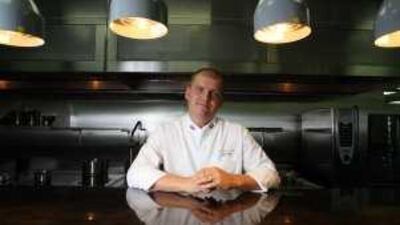DUBAI // The vision of one man resulted in the dream job of another when a Saudi businessman, intent on opening a unique restaurant in Dubai, hired the Slovakian chef Juraj Kalna. The businessman, who wishes to remain anonymous, was a regular visitor to a restaurant at Mr Kalna's former employer, Jumeirah Emirates Towers hotel. When Mr Kalna was approached to become The Edge's executive chef, he had no hesitation in accepting the offer.
"The owner of this place was a regular guest at the Emirates Towers," said Mr Kalna, 30. "We were discussing the vision and I loved it so much. That's why I joined." Mr Kalna has been the only executive chef at The Edge since it started four years ago. In that time, there has not been one customer complaint. "I am very passionate about this place. There are many good chefs in the world; I am lucky to be here."
But it was more than luck that resulted in Mr Kalna's posting. He has twice been awarded the Chef of the Year title in the UAE, has won more than 30 gold medals in cooking competitions in the last six years and is one of the seven finalists in next year's Global Chefs Challenge in Chile. There, he will represent Africa and the Middle East in what is considered the world's largest culinary contest.
Until recently, The Edge, in the Dubai International Financial Centre, was open only to private diners - those with the right connections. Now, it is open to the public. Dinner there costs a minimum Dh600 (US$160) per person. Then there is an Dh800 option of between seven and nine courses, depending on the produce Mr Kalna has in. The full experience costs Dh1,200 per person. "In this option, you have to stop me cooking. You will be eating until you say, 'Chef, I am too full, I cannot even go home.'"
Mr Kalna hopes to help turn The Edge into an establishment to which customers will travel from around the globe. VIPs, celebrities and leading business people have visited. But Mr Kalna, keen to protect their privacy, would not name names. Customers must phone to make a reservation and are often catered for privately. On arrival, they are not given a menu, but are asked by Mr Kalna, who often works a 16-hour shift, whether they are allergic to anything or particularly dislike a certain food. He then prepares their meal with fresh international ingredients, sourced from contacts throughout the emirate.
"I have a few suppliers who take care of me nicely. They call me and say, 'I have this and I have that'. Then I have a few regular people who also call me when something new comes." Pork is off the menu, as The Edge is fully halal, and nausea-inducing ingredients, such as brains, are never used. "I love it because you can always do different and new things," Mr Kalna said. But he stressed that, unlike other chefs around the globe, some of whom he thinks experiment a bit too much, he keeps things a little less eclectic. "You will know what it is when you see it on your plate. We want you to enjoy it."
As a child, Mr Kalna was taught to cook by his mother in Slovakia. He helped her to prepare traditional dishes such as deep-fried Edam, roast beef with sour cabbage and bread dumplings, some of which he still cooks today for his wife, Maria, whom he has known since the age of seven, and their daughters, Emma and Victoria. Despite his patriotism and pride in Slovakian culture, he is unlikely to return home to live now that his career is reaching such heights.
"Slovakia is a very nice country, but for chefs there is nothing interesting there for those that want to achieve something. Whoever I meet anywhere in the world has never heard of any other Slovakian chef." At 14, Mr Kalna worked part-time in a Moroccan restaurant called Casablanca in Slovakia. By the time he left school at 18, he had been promoted to full-time chef. After one year's military service, in which he also worked as a chef, he landed a job cooking for Slovakia's minister of defence at VIP functions.
Following that, and jobs in various kitchens across Europe, he went to Florida, where for two years he worked in a hotel. Now, having been a Dubai resident for almost 10 years, Mr Kalna feels more settled. Spare moments are spent with his family, either at his home in Mirdiff or visiting the beach, parks and other emirates. "I always wanted to come to Dubai - it was Dubai, the shiny city," he said. "I like this place especially because I come from a cold country, I like palm trees and the beach. You can achieve a lot here in a short time."
Despite living in a country that offers almost every kind of international cuisine, Mr Kalna does not make the most of that luxury. "I eat a lot of junk food; all chefs love junk food," he said. "You get tired of being around so much good food. We leave work and want to go somewhere else. I am particular, though; if I don't like the burger I am given, I will ask them to change it and make it better."
@Email:asafdar@thenational.ae

